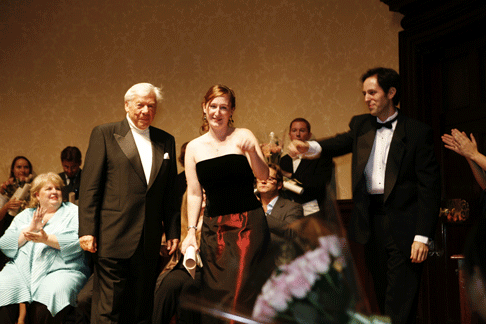I talked to John Gilhooly and to Dr Ralph Kohn, whose Foundation underpins the Competition both philosophically and financially, about the challenges and special qualities of this much-anticipated event. Both were very clear about what they are looking for - Dr Kohn selects ‘intimacy of communication with a chamber music audience’ as vital, and he recalls the genesis of the competition in his collaboration with Graham Johnson: ‘Since I’ve always been very keen to support young singers, I was very receptive when Graham suggested that the Wigmore might be the ideal venue for a competition, perhaps one where we seek special qualities not looked for in other events.’
John Gilhooly, as Chairman, leaves no room for doubt - ‘ First of all, I tell the jury from the outset, and I repeat this every day, that we are not looking for the singer with the highest decibel level: what we seek is a singer who can sustain a song recital in any of the great halls of the world, because if we give someone a recital here, then Vienna, New York, Amsterdam, will take notice, so the jury needs to feel - can s/he keep my interest for a whole recital, and not just a small group?’
Both point out that in opera, you have the staging, costume, prompt, colleagues and so on, but in recital you are ‘alone up there, hopefully without the music stand’ - and this is where the Wigmore audience comes in. Dr Kohn identifies this as one of the competition’s unique features - ‘You are performing before people who have the most profound understanding of the music, who have been coming here for years and who feel a great sense of loyalty to the Hall and the competition itself; they also want you to do well - it’s a very sympathetic and enabling audience.’
Gilhooly dismisses the notion of the Wigmore audience as ‘elderly’ as ‘a myth’ - ‘our regular audience has gone from a core of 5000 to a core of 25,000; for many concerts we have found that 50% of the audience has been under 40, and even so, I believe that the holy grail of the ‘young’ audience is all very well, but you have to account for time and what people can fit in: I’m 36 and many of my friends have long days in the city or are doctors and so on, and so to fit in a 7.30 recital is not easy. When people get into their 50s and their children have gone off to University and so on, we find that it’s then they have time to attend more concerts.’
Although the competition looks for future greatness, Dr Kohn points out that ‘winning is not everything in this context - it’s also being given feedback from some of the greatest singers and accompanists, about meeting with colleagues’ and Gilhooly concurs ‘If we don’t find the next great recitalist, it’s not a failure - young singers have been given a chance to perform before their peers, and it also enshrines the notion of the Wigmore as the world centre for song.’ He points out that there have been previous years in which those who did not win have also gone on to great things - Joyce di Donato being a prime example - and that such seemingly minor aspects as the preparation of programmes can be hugely influential.
 Martha Guth with Ralph Kohn and Spencer Myer at the 2007 competition final [Photo by Ben Ealovega]
Martha Guth with Ralph Kohn and Spencer Myer at the 2007 competition final [Photo by Ben Ealovega]
The competition does not ignore those whose prowess may tend more towards opera, since after the judging for the main competition is over, the jury is able to award a special bursary given by Independent Opera, which specifically rewards a singer who shows operatic potential - the most recent winner of this was Matthew Rose, a baritone surely now familiar from appearances on many stages.
The Wigmore Hall begins the 2009-10 season with the confidence that last year’s attendance was up 30% on the previous, with many concerts already sold out well in advance. They are already gearing up for the 110th anniversary in 2011, about which John Gilhooly is saying nothing yet except that it will be ‘very special’ and we should ‘expect many surprises.’ Those of us fortunate enough to be regulars at this unique venue know that it always holds the most wonderful surprises, some of which will no doubt be unveiled during the Singing Competition: if you’d like to attend the preliminary rounds, they are on September 6th and 7th at 11.00 am and 15.00 pm, the Semi-Final is on Tuesday 8th at 15.00, and the Final and Prize Giving on Thursday 10th at 18.00.
Melanie Eskenazi

